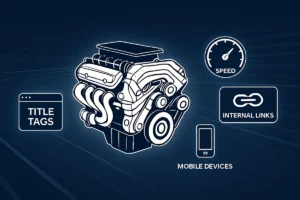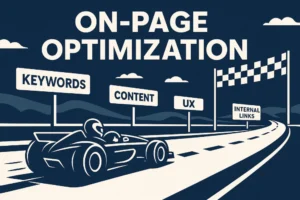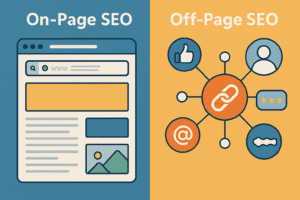When people talk about websites and applications, they often mix them up. But these two are not the same thing! If you’re curious about how they differ, why they matter, or how to choose the right one, you’ve come to the right place. Let’s break it all down in a simple, easy-to-understand way that covers everything you need to know—and more!
What Are Websites and Applications?
What Is a Website?
A website is like an online book or a big notice board. It has pages full of information that anyone can read. Websites are often used to share news, ideas, or details about a company. They’re simple to use and don’t ask you to do much except read or click links. If you’ve ever Googled something and landed on a page full of text and images, that’s a website!
Websites are all about delivering information. Think of them as a public library where anyone can come in, pick up a book, and browse without needing to do anything complicated. They’re straightforward and meant to reach a broad audience.
Examples of Websites:
- News sites like BBC or CNN where you read articles
- Blogs where people write about hobbies, recipes, or travel
- Personal portfolios showing off skills like photography or design
- Company websites giving details about their services and products
Main Things About Websites:
- Made mostly to give out information
- You don’t need to do much except look at them
- Can open in any browser without fancy tools
- Easier and cheaper to make than apps
- Perfect for reaching a broad audience with minimal effort
- Works well for businesses just starting out online
What Is an Application?
An application, or app, is more like a tool you can use on the web. It lets you do things like shop, write documents, or chat with friends. Apps are interactive, which means they let you click, type, and make things happen. They’re often more complex than websites because they’re built to handle user input and give feedback.
Applications are task-driven. They’re like a Swiss Army knife of the digital world, allowing users to perform specific actions. They can range from something as simple as a to-do list app to something as complex as a banking platform.
Examples of Applications:
- Google Docs for typing, editing, and sharing files
- Amazon for shopping and checking out reviews
- Instagram for sharing pictures, stories, and chatting
- Online banking platforms where you manage your money
Main Things About Applications:
- Let you interact and complete tasks
- Need more advanced programming to build
- Often ask you to log in with a username
- Can work together with other apps or tools
- Designed for solving specific problems or needs
- Offer more advanced, customizable features
How Are Websites and Applications Different?
What They’re For
Websites are like a display case—you look, read, and maybe learn something. Applications are like a toolbox—you use them to get stuff done. Websites focus on giving information, while apps let you perform tasks. If you want to explain who you are or what your business does, you need a website. If you want users to order products, book appointments, or work together, you need an application.
Applications are also designed to evolve. They adapt to user needs over time, while websites often remain static unless updated manually. This dynamic nature makes apps indispensable for businesses that require frequent customer interaction.
How They’re Built
- Websites: Made with simple stuff like HTML, CSS, and sometimes JavaScript. They’re fairly straightforward and don’t require as much work to maintain.
- Applications: Built with more advanced tools like frameworks (React, Angular) and back-end coding languages (Python, Java). They take longer to create but offer a lot more functionality.
Developers often use Content Management Systems (CMS) for websites, like WordPress or Wix, which make website creation faster. Applications, however, need specialized coding, database integration, and more.
How You Use Them
Websites are mostly static, which means they don’t change much. You just scroll and read. Apps are dynamic—you click buttons, type things, and they respond right away. For example, booking a flight online involves interacting with a web application, while reading about the airline’s history would be on their website.
Apps are also more personalized. They often remember your preferences and tailor their experience to your needs—like Netflix recommending shows based on what you’ve watched.
Why Does This Matter for You?
Why Pick a Website?
- You’re working with a smaller budget. Websites are great for visibility. Think of them as your business’s digital business card—it’s all about being seen.
If you’re ready to create a website tailored to your business needs, let’s make it happen! Click the button below to book a consultation call to discuss your website needs.
Why Pick a Web Application?
- You’re aiming for advanced functionality and deeper user engagementApps are essential for industries that require active participation from users. From healthcare platforms to social media, apps create interactive experiences that websites simply can’t.
Can You Mix Websites and Applications?
Yes! Sometimes websites and apps combine into one platform. For example, an online store might have static pages (to show products) and interactive features (like a shopping cart and payment system). This mix gives users both information and tools to use. Another example is a news website that also offers subscription-based premium content through a login system—part website, part application.
Hybrid models are becoming increasingly popular. They offer businesses the flexibility to provide information while also enabling users to take actions, making them highly versatile.
What’s the Best Choice for You Between Websites and Applications?
It all depends on what you want to do. If you just need to share information, go with a website. If you need users to interact, go with an app. And if you’re not sure, talk to a professional who can guide you in the right direction.
No matter which you choose, make sure it’s easy to use and works for your audience. Good Websites and Applications can make a huge difference for your business or project. Take the time to plan, and you’ll be on your way to creating something amazing.

I design high-performing WordPress + Elementor websites and WooCommerce stores that rank on Google and convert visitors into customers. At Katmantra Web Design and SEO, I combine clean design with smart SEO so your site works as hard as you do.





